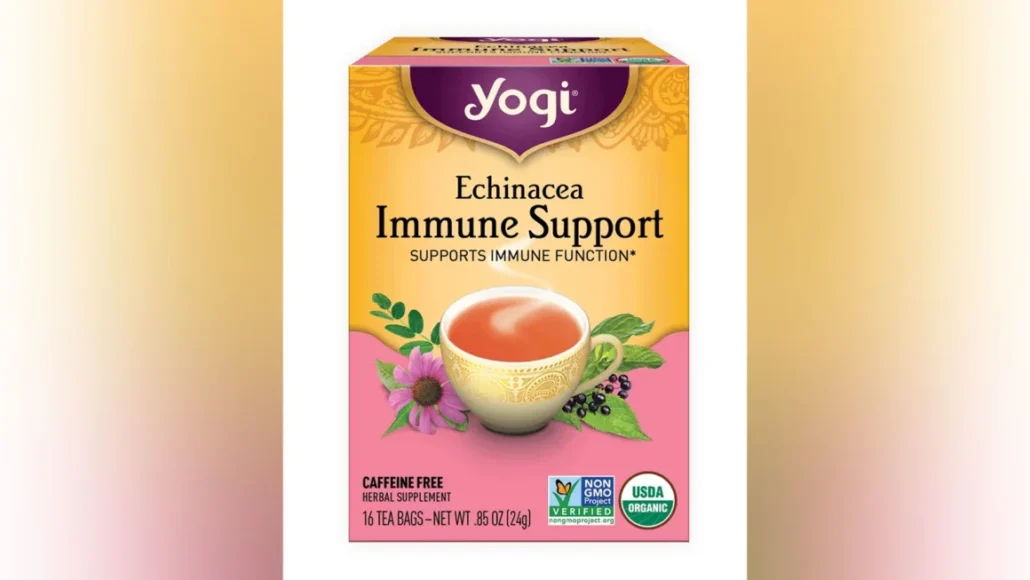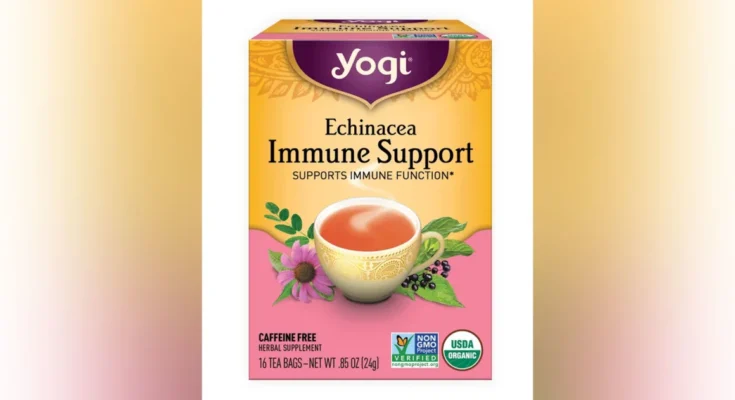East West Tea Company, LLC has issued a significant recall of its popular Organic Yogi Echinacea Immune Support tea bags due to the detection of pesticide residues above acceptable levels. This voluntary recall, initiated on March 12, 2024, involves nearly 900,000 tea bags distributed across the United States, raising concerns about food safety and the presence of pesticides in organic products.

Details of the Recall
The recall affects approximately 90,000 boxes of Organic Yogi Echinacea Immune Support tea, sold in 16-count boxes. These boxes bear the UPC number 0 76950 45010 3 and include various lot codes, which are listed in the table below. Consumers are advised to check their tea supplies and dispose of any products matching the recalled lot codes.
Recalled Boxes UPC Number:
| Lot Codes | Lot Codes | Lot Codes |
|---|---|---|
| 0000184330 | 0000184853 | 0000185098 |
| 0000185100 | 0000185383 | 0000185385 |
| 0000185387 | 0000185389 | 0000185434 |
| 0000185436 | 0000185828 | 0000185830 |
| 0000185832 | 0000186519 | 0000186521 |
| 000184062 | 0000186900 | 0000186902 |
| 0000186904 | 0000187357 | 0000187359 |
| 0000187400 | 0000187402 | 0000187769 |
| 0000188028 | 0000188030 | 0000188045 |
| 0000188114 | 0000186600 | 0000186910 |
| 0000187155 | 0000184691 | 0000184963 |
| 0000185381 | 0000185518 |
The FDA’s Role and Classification
The U.S. Food and Drug Administration (FDA) classified this recall as a “Class III” recall. This classification means that while the product violates regulatory standards, the use or exposure to the product is not likely to cause adverse health consequences. The FDA’s ongoing investigation aims to ensure that such incidents are addressed promptly to maintain consumer safety.
The FDA monitors pesticide residues in food through its pesticide residue monitoring program. This program analyzes over 4,000 food samples annually for approximately 800 different pesticide residues, ensuring that chemical residues in foods do not exceed limits set by the Environmental Protection Agency (EPA). The levels of pesticides detected in the Yogi tea bags exceeded these limits, prompting the recall.
Pesticides in Organic Products
Pesticides are used to control pests such as insects, rodents, weeds, bacteria, mold, and fungus. Although organic products are generally grown without synthetic pesticides, contamination can occur through environmental factors like pesticide drift from nearby farms. East West Tea Company maintains that they do not use pesticides in their farming practices. However, they acknowledge the possibility of contamination from neighboring farms.
Pesticides can be harmful at certain levels, affecting the nervous system, irritating the skin or eyes, and in some cases, being carcinogenic or impacting hormones. The best way to minimize pesticide exposure is by choosing organic products from reputable brands, although organic labeling does not guarantee a product is completely pesticide-free.
Consumer Action and Company Response
Consumers who have purchased the recalled tea are advised not to use it and to discard any affected boxes. While it remains unclear if East West Tea Company will offer refunds or exchanges, they have been proactive in communicating the issue and working with the FDA to resolve it.
The company has emphasized that the traces of pesticides found in the tea bags pose no risk of harm or illness but do not meet their high-quality standards. This incident highlights the challenges in maintaining organic integrity and the importance of rigorous testing and quality control in the food industry.
End Note
The recall of nearly 900,000 Yogi tea bags due to pesticide contamination underscores the ongoing need for vigilance in food safety. While the detected pesticide levels are not expected to cause health issues, the recall reflects the commitment of both the FDA and East West Tea Company to uphold consumer safety and product quality. Consumers are encouraged to stay informed about recalls and to support brands that prioritize transparency and stringent quality standards.
















